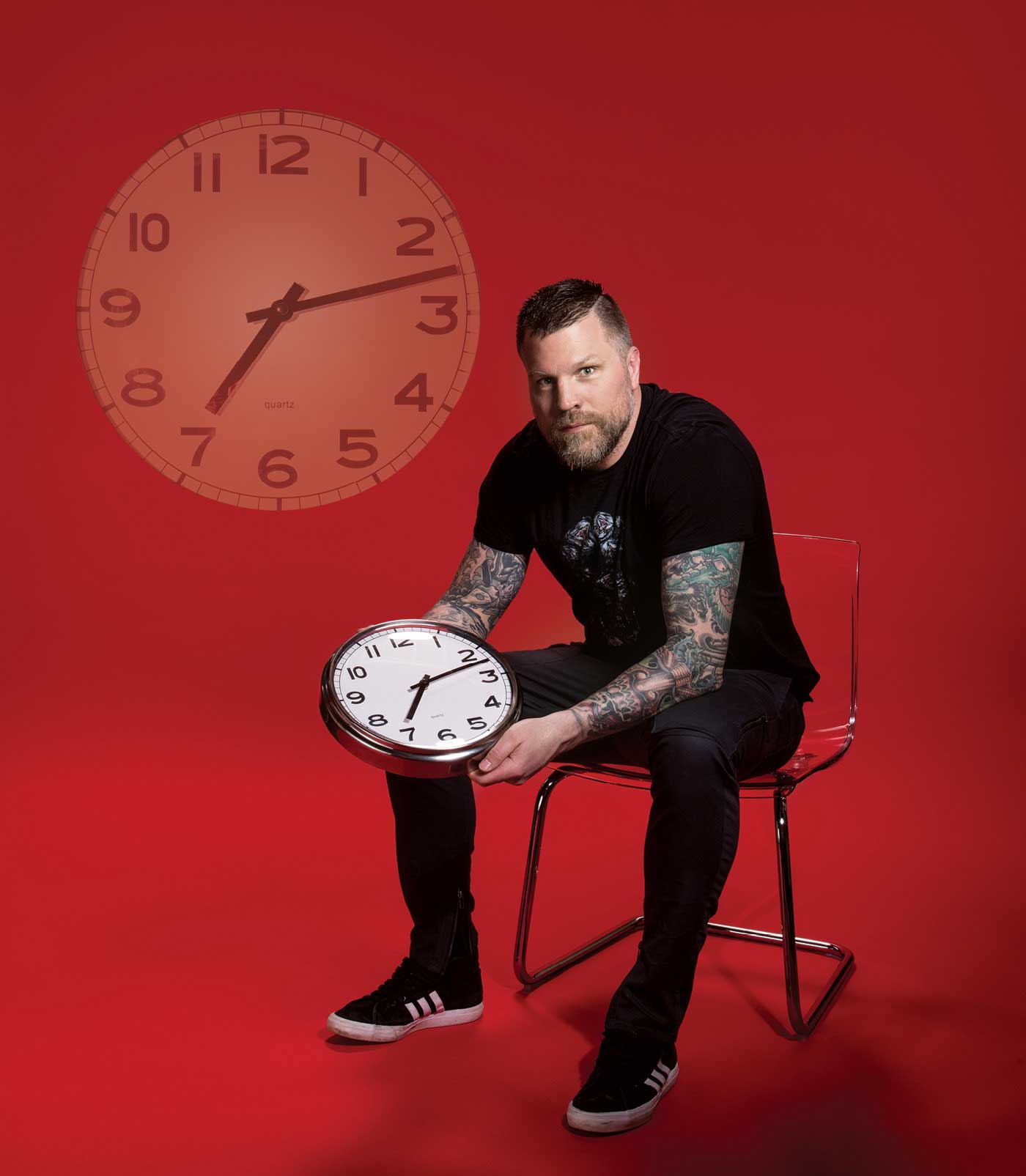
Time is one of the great equalizers — we all get the same amount of it in the day. Whether you’re trying to run a company, raise a family, or have the most fun possible (or some enjoyable mix of the three) learning to manage time is what separates high achievers from those who merely stumble through life. But coming up with a system that allows you to maximize your efficiency at work and at home can, ironically, be very time consuming, as can setting your priorities. From the newly retired former VP of an oil-and-gas company, to a career coach, a high-end boutique lawyer, and others, all of the following people were forced to come up with ways to better manage their time. And even if you can’t afford to hire a personal shopper to help you save time, there are tips to be learned from these Calgarians.

When You Suddenly Have a Lot of Time
You’d think that being vice-president of an international oil-and-gas company, working the requisite 70-plus hours a week and managing more than 200 employees would make anyone welcome all the free time possible. But there can be too much of a good thing.
When Pierre Gagnon retired at 56 in the spring of 2017, he went from working in a position where almost all of his time was planned for him, to being forced to manage that task himself.
“I was very lost. There used to be forms, meetings and worksheets that I had to do. I have to make my own schedule now,” says Gagnon. “I had to send myself a couple of test emails to make sure my phone was still working.”
The first thing Gagnon did after he retired was go on vacation. But the reality of retirement hadn’t really set in yet and it felt like just another holiday, not the beginning of his retirement. When Gagnon got back, he fell into a summer-season routine. He kept busy doing work around the house, catching up with friends over coffee and playing golf.
But that first winter in 2017 was a whole different story. Gagnon knew he needed to change his approach to retirement when he found himself binge-watching TV for days in a row. “You don’t feel good. You probably overeat and certainly don’t exercise,” says Gagnon. “It was either go back to work or do something different.”
He quickly realized that he had to learn how to schedule himself and set his own deadlines. “You have to plan your days, otherwise you end up doing nothing except scrolling on Facebook, or watching TV, which doesn’t add to anything,” says Gagnon.
According to Dr. Candace Konnert, an associate professor at the University of Calgary, and director of the Healthy Aging Lab at the U of C, the discovery that Gagnon had — that lack of things to do can also translate to lack of meaning — is quite common for retirees. “Many people go through a honeymoon period where they are very happy to be free from work responsibilities. It’s a time of transition where people are figuring out how to spend their time,” she says.
According to Konnert, research has shown that finding personal meaning outside of the workforce is an important part of retired people’s lives. A 2014 MassMutual study found that 11 per cent of retirees found themselves lacking a sense of purpose.
Gagnon had spent most of his working career taking care of the economics of retirement — he had decided at an early point in his career that he wanted to retire at 58 and believes that setting that goal was essential to him being financially prepared by that age and actually beating his goal by two years. However, he hadn’t really considered how he was actually going to spend his time once he reached his financial goal. He struggled early on in his retirement to fill his time. He had thought his hobbies would have taken up most of his days, but they didn’t.
Konnert sees this often. She notes that while financial planning is certainly important, planning time and finding meaningful activities is just as valuable. “You need a certain amount of money to meet your basic needs, but beyond that I don’t think having a lot of money is a good predictor of healthy aging,” she says.
Gagnon says he has learned that while the tasks he does now may not be as high-stress as the ones he undertook when he was working, it’s the sense of accomplishment he gets from completing them that matters most.
“I truly believe that people don’t understand that they have to get their self-satisfaction from things that are totally different than they’re used to doing,” he says. Gagnon now spends a good amount of his time building and managing a community garden.
In addition to finding meaningful projects to work on, Gagnon has found that he actually needed to schedule his days much as he did when he was working. That act of deciding what to do when and planning things out has helped him adjust to retirement.
“That’s what I figured out: you still have to have those schedules, you still have to prioritize,” he says. “When you retire, things are going to change dramatically. Nobody is going to be looking after you — you have to do that yourself.”

When You Kind-of Retire at 35
Brian McGrattan, a former NHL player who spent four seasons with the Calgary Flames, has lived most of his life in hockey arenas. So, when he retired after the 2016-2017 season at the age of 35, he felt a sense of relief, but he also found himself in an uncomfortable situation. “A lot of people are just starting their careers by the time they’re 35 and mine was ending,” McGrattan says. The day-to-day routine of professional hockey had been McGrattan’s life for more than 15 years, and now it was over.
Even though McGrattan had retired at an early age compared to the average worker, he had intuitively followed the advice of retirement experts such as Dr. Candace Konnert of the Healthy Aging Lab at the U of C and taken steps to prepare for the next part of his career.
McGrattan knew he wanted to stay involved in hockey in some way once his playing days were over. Throughout his career, he built a retirement plan that included developing relationships within the game and making it clear that he wanted to continue to work after he was done playing. In August of 2017, the Flames offered McGrattan a job in player assistance, a position created just for him.
Now, McGrattan provides support and guidance for players in the Flames organization. He helps players through personal struggles, focusing on maximizing their careers and planning for a post-hockey life. Retiring from the NHL is like any kind of retirement when it comes to planning, but in some ways the stakes are higher. The nest egg is likely larger (according to a 2013 Business Insider story, NHL players on average make $13.6 million in career earnings). Retirement is longer as well, in terms of years.
“You start getting into your late ’20s, you have to start thinking about what’s next,” says McGrattan. “A lot of guys make a lot of money, but you still have to do something. You can’t just sit around all day, you’ll go crazy.”
Despite “retiring,” what McGrattan did could be seen more as a career change. Only six per cent of Canadians hold one job their whole lives, according to a 2014 Workopolis study. Keeping in touch with your extended network and letting them know your long-term goals is a useful tactic both for retirees and for those contemplating a career change.
While it took McGrattan a while to adjust to his new role off the ice, he eventually got the hang of it. He immersed himself in every aspect of hockey operations, and management helped him adjust to the role. He now finds himself looking at the game through a different lens. “I thought it was stressful being a player, but it’s the same for management,” McGrattan says. “The pressure to win is all throughout the organization.”

When You Realize That Your Time is More Valuable Than Your Money
For 12 years, Evelyn Ackah worked at large law firms on Bay Street in Toronto. She would often be at work at 7 a.m., and not get home until midnight. But when she decided to adopt two kids as a single parent, she knew that she wouldn’t be able to continue to work at that pace. She saw how many of the other partners at her firm didn’t spend much time with their families and decided to set her priorities differently.
“At a large global firm, there’s not a lot of balance. It’s 18-hour days, six, seven days a week for weeks on end,” says Ackah. “It’s just a very intense way of practicing law. I loved it, but I couldn’t do it any longer. I needed to make a lifestyle change.”
Ackah moved to Calgary in 2008 and opened her firm, Ackah Business Immigration Law, in 2010. She decided to delegate and outsource tasks that she doesn’t see as being essential to her professional or personal life. “If I’m a $600-an-hour lawyer, does it really make sense for me to mow my little patch of grass, when I can be hiking with my kids?” says Ackah. Now she has a live-in nanny, a lawn-maintenance company and she often hires a professional shopper to save her even more time.
“There are some things I don’t need to do,” says Ackah. “But I need to be the one hugging my children. I’m the one that needs to be giving them bandages when they fall and scrape their knees.”
Likewise, Ackah used to feel she had to take on every aspect of her work and business. Now, she doesn’t worry about doing tasks she can outsource. Over time, she found that the more she delegated tasks to others, the more she could focus on the work that only she could do. Giving tasks that didn’t require her attention to others meant she had freed up her own time and mental space so that she could focus on growing her business and planning vacations with her kids.
A study published in the Proceedings of the National Academy of Sciences found that outsourcing everyday tasks can combat feelings of time stress and promote happiness. Not surprisingly, feelings of time stress were found to lead to increased anxiety and to reduce well-being. In a survey of more than 6,000 people, researchers found that spending money to “buy time” was linked to greater life satisfaction than spending the same money on objects.
And that’s exactly what Ackah does. If paying for a service saves her time and lets her be with her kids more, she sees it as a worthwhile investment, not an indulgence.
Time management is also key for Ackah, and she uses technology to stay on top of her schedule. Clients, legal assistants and employees are all organized and prioritized through her online calendar. Applications like SimplyFile, Acuity, Cleo and Lexicata help her do everything from organize files to track potential clients. But as much as cloud-based systems are a big part of how she operates, Ackah also keeps a physical calendar on her fridge at home that she shares with her nanny and which tracks all of her kids’ activities.
Owning her own business certainly gives Ackah the flexibility of being able to rely on employees for certain tasks and use that saved time to be with her family. But you don’t have to be an entrepreneur to implement her principles of time management and outsourcing of tasks.
Ackah’s entire calendar is focused on making sure that she gets her work done, then gets home. Her kids are the priority, and her assistant will even make scheduling decisions to ensure that she spends enough time with her family. “It’s a good balance. It’s not perfect, but I do the best that I can,” she says.
Read more: 4 Calgary Services That Can Buy You Time

When You’re an Entrepreneur With a Family
Jameela Ghann and Peter Niongwe are married business partners who co-founded and operate Alora Boutique, a jewellery company focused on creating quality products and giving back to the community. Alora donates five per cent of its proceeds to charities focused on women and also gives back through a number of organizations, including the Mustard Seed.
How did you manage your time when you started your business, versus now?
Jameela Ghann: We definitely were not efficient at the beginning. We were just trying to figure it out.
Peter Niongwe: Once you get past that initial stage you start to figure out where you can maximize your time. As you grow your business, you really start to figure out what is valuable and what you can let go.
How do you usually spend your days?
JG: I block off my morning, right after breakfast and before lunch, where I can be most productive. Mostly it’s the activities that are going to grow my business and make me money. Then I’ll let all the other to-do’s fall in place. If I get around to them I get around to them, great, but I know I’ve already done the most important things first.
How do you balance working and raising a family?
JG: We try to make sure that when we’re spending time with our kids, we’re always present. We always try to make Sunday a family day.
PN: We also know that there are days where we just can’t do it because of the business. Every day we’re not with our kids, we’re doing eight hours. Eight solid hours and nothing else.
Any tips for other people in similar situations?
PN: One thing we learned was the “tornado method.” You start by looking at your year in January and planning big things out. Then planning your quarters out, then your weeks out. That’s allowed us to kind of see things as a bigger picture and helped us visualize what we wanted to do. Prioritizing your days, I think that’s really important.
JG: You should ask for help where you can. Don’t ever be afraid to ask your cousin, “Hey can you watch my kid on this night?” Also, let certain things go. Don’t be so hard on yourself when you don’t get everything done — you can’t get everything done. It’s about deciding what’s important to you.

When You’re Trying to Have it All
The truth is that if you don’t decide what your goals are and pursue them with focus, it’s very unlikely that you’ll achieve them. It seems pretty obvious, yet, it trips a lot of us up.
“I may be naïve, but I truly believe that you can have it all,” says Alison Geskin. “You can have a great relationship, be kickass at whatever you do and enjoy your life.” For both companies and individuals, Geskin believes one of the biggest time wasters getting in the way of “having it all” is indecisiveness — not setting or not sticking to your priorities.
Geskin runs two businesses, both related to helping people learn the best ways to maximize time and efficiency. Through her consulting and coaching company, The Art of Strategy, she works with companies to help them work through “pain points” in communications and growth. And through her couple’s retreat program, she helps people focus on strengthening their relationships before they fall apart. There’s no one-size-fits-all solution for those who hire Geskin, although she does use the term “re-purposing energy” to describe the advice she gives clients and friends. That usually means helping people set priorities and then learning to focus their efforts into them, because the second thing standing between you and your goals is distraction.
Although many people say that their relationships are the most important part of their lives, Geskin says she often finds the way people actually manage their lives doesn’t reflect that. When gauging how to help people manage their priorities, Geskin asks her clients to list and rank the five “hats” that they wear to determine what roles they identify as significant. What she finds is that people will almost never put their relationship in their top five roles, and often it doesn’t even come close.
“Your relationship is the one constant in your life that sets the tone for everything,” says Geskin. “If you’re not happy in your relationship, you cannot thrive at anything else, either.”
If listing your priorities is step one to getting to your business and personal goals, measuring your follow-through is step two. That means looking at how much time, effort and money you put into each thing you’re doing and making sure that allocation matches your priorities. For example, if your priorities are career growth, fitness and your friends, but you spend your time watching Netflix alone on the couch, there’s obviously a disconnect.
One of the biggest reasons Geskin sees people struggling to maintain their workload and burning out stems directly from a lack of self-care. When people don’t take care of themselves, they can’t take care of anyone else — just like the flight attendant says, you need to put your own oxygen mask on first.
“A lot of people don’t allow themselves the luxury to be able to accept that,” says Geskin, who recalls how she used to feel guilty when she would take a day off. Now she works to help her clients understand that they shouldn’t feel guilty for taking the opportunity to recharge. That is especially important in relationships, she says. Many of the people who go to Geskin’s couple’s retreat have seen themselves become focused on their work and, as a result, have let their relationship fall to the backseat. It takes time and work to help them refocus their goals to fit into the parts of their lives that make them happy.
“There’s so much noise and so many distractions out there. I think people get lost along the way,” says Geskin. Prioritizing and planning helps clear away distractions that no longer need to be focused on. “To be able to control the chaos is really important.”
